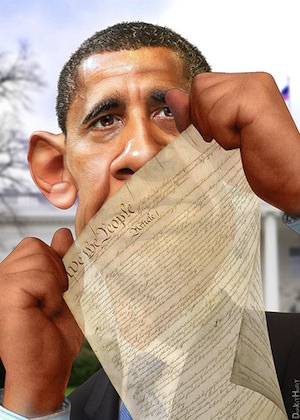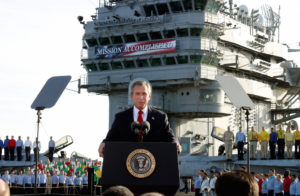Obama Signs NDAA, Maintaining Indefinite Detention Provision
In an odd juxtaposition, Obama signed the 2014 National Defense Authorization Act on Thursday while criticizing Congress for abridging the constitutional separation of powers, yet is unconcerned about the violation of individual constitutional rights contained in the law.
President Obama took a break from his Hawaii vacation Thursday to sign the new National Defense Authorization Act, which he criticized for not giving him the flexibility he needs to close Guantanamo Bay. But it also retains the government’s authority to indefinitely detain U.S. citizens, a detail he didn’t seem to mind so much.
The new NDAA makes it easier for the government to transfer Gitmo detainees to other countries, but continues a ban on moving them to the U.S. for trial. From the Los Angeles Times:
The new defense authorization bill includes measures that ease what Obama called “rigid restrictions” that have interfered with his ability to negotiate with other countries about where detainees could be sent.
But Obama argued that the relaxation of the rules did not go far enough because it did not “eliminate all of the unwarranted limitations” on prisoner transfers. He asserted that his office must have the flexibility to “act swiftly” when negotiating with other countries about how and where detainees would be transferred.
The president said “in certain circumstances” the rules Congress has put in place could “violate constitutional separation of powers principles” – language that leaves open the possibility that the administration could argue it is not bound by the restrictions it considers unconstitutional.
The president also cited his objections to several sections of the bill that restrict the use of U.S. funds to transfer Guantanamo detainees to U.S. facilities or house them on U.S. soil — arguing that his administration must have that authority.
Yet Obama was less concerned with the constitutional rights of American citizens, who can still be detained indefinitely under the NDAA. From Salon:
Meanwhile the troubling NDAA provision first signed into law in 2012, which permits the military to detain individuals indefinitely without trial, remains on the books for 2014. Efforts to quash or reform the provision (especially with regards to the indefinite detention of U.S. citizens) have failed and been fiercely fought by the administration. Most notably, a lawsuit filed against the president by plaintiffs including journalist Chris Hedges, Noam Chomsky and Daniel Ellsberg against the provision has been aggressively fought at every turn by the president’s attorneys. The plaintiffs argue that the NDAA provision constitutes a significant expansion of the laws regarding indefinite detention already established by Authorization for Use of Military Force (AUMF).
Hedges has chronicled his fight against the detention provision of the NDAA here at Truthdig. And it should be a worrisome provision for anyone who believes in basic American civil liberties, which have been significantly eroded since the 9/11 terrorist attacks.
Interestingly, the U.S. has a long history of clamping down on civil liberties in times of political stress, which Geoffrey Stone detailed admirably in his 2004 “Perilous Times: Free Speech in Wartime — From the Sedition Act of 1798 to the War on Terrorism” (I dove into a single case, Dennis v. US, in my 2011 book “The Fear Within: Spies, Commies, and American Democracy on Trial“). In past suppressions, the government, after emotions and the fears subsided, generally corrected the excesses it had embraced (usually through court decisions). But here, a dozen years after the catalyzing event, there is no sign of the government recognizing that it had erred in a fundamental way by infringing on basic civil liberties, which suggests some of these clampdowns may be here to stay — a frightening thing to contemplate.
—Posted by Scott Martelle.
Your support matters…Independent journalism is under threat and overshadowed by heavily funded mainstream media.
You can help level the playing field. Become a member.
Your tax-deductible contribution keeps us digging beneath the headlines to give you thought-provoking, investigative reporting and analysis that unearths what's really happening- without compromise.
Give today to support our courageous, independent journalists.









You need to be a supporter to comment.
There are currently no responses to this article.
Be the first to respond.